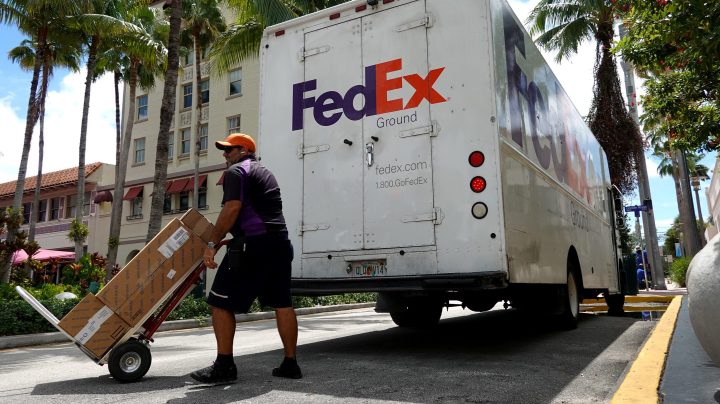
FedEx says shipping volume is down. That’s a bad sign for the global economy.
FedEx says shipping volume is down. That’s a bad sign for the global economy.

FedEx reported on Thursday that it’s seeing a decrease in shipping volume both in the United States and abroad. That sent FedEx shares tumbling 21% Friday and took other shipping stocks with it, including UPS and DHL. FedEx’s CEO told CNBC Thursday he believed the dip in shipping volume is a sign that a global recession is coming.
Freight volume is generally a good indicator of economic activity because, well, someone bought all those goods being shipped on planes.
“So when we see major logistics firms like FedEx report disconcerting results, it can send up alarm bells for all kinds of economic onlookers,” said Adie Tomer, a senior fellow at the Brookings Institution.
FedEx is blaming a weakening economy in Asia, among other things, for the decrease in shipping volume. And that’s part of it, said Bank of America analyst Ken Hoexter.
But, he said, part of it is “self-inflicted.”
Six years ago, for example, FedEx bought a European company called TNT Express.
And the next year, it was hit by a cyberattack. That caused disruptions to service and took some recovery time.
“And anytime you have service issues, customers flee to competitive networks,” Hoexter said.
He also pointed out that about half of FedEx’s business comes from its Express service, which is when people want a package, like, yesterday.
That means it can’t hold planes, even if they’re not totally full.
“If volumes start to decline, and now your planes are 80% full, instead of 90%, full or 70%? Well, you still have to fly the plane,” said Hoexter. “So you have the fixed cost without the revenue.”
The decrease in volume could also be related to more people shopping in person, as opposed to having things shipped directly, like they were at the beginning of the pandemic.
“It’s us now going to the store to buy toothpaste and not ordering it online,” said Allison Poliniak-Cusic, an equity analyst covering transportation and industrial technology at Wells Fargo. “So we’ve returned to a little bit more normal behavior.”
FedEx announced cost-cutting measures, including reducing the frequency of its flights and closing more than 90 FedEx Office locations — all of which is unusual in the lead-up to the holidays.
The cuts indicate FedEx is anticipating the holiday season will fall short of expectations, said Matthias Winkenbach, a research scientist at the MIT Center for Transportation and Logistics.
“Typically, shippers at this time of the year invest into having excess capacity, having rather too many than too few trucks on the road,” he said.
Winkenbach said a downturn might prompt FedEx and other logistics companies to change how they approach necessary innovations.
“Think about electrification of fleets. Think about more sustainable delivery models,” he said.
He wondered whether FedEx and its competitors will see a downturn as a reason to scale down those efforts — or double down on them.
There’s a lot happening in the world. Through it all, Marketplace is here for you.
You rely on Marketplace to break down the world’s events and tell you how it affects you in a fact-based, approachable way. We rely on your financial support to keep making that possible.
Your donation today powers the independent journalism that you rely on. For just $5/month, you can help sustain Marketplace so we can keep reporting on the things that matter to you.











